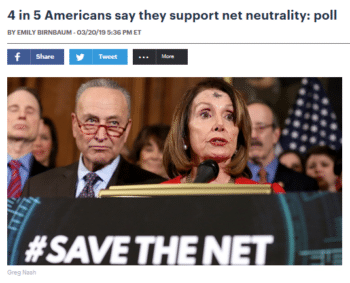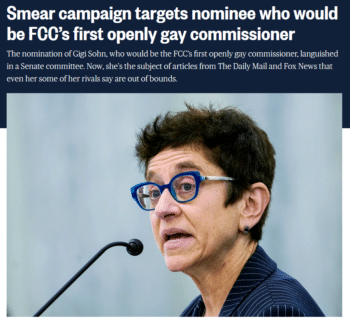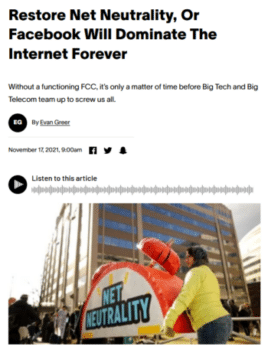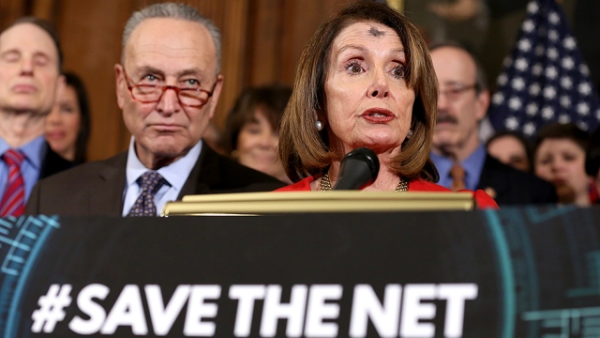Remember Ajit Pai, the former Verizon lawyer Trump put in charge of the Federal Communications Commission (FCC)? When he gutted net neutrality rules and kneecapped the agency’s ability to regulate telecom monopolies, voters from across the political spectrum were outraged. The internet erupted in protest.

Democrats like Senate Majority Leader Chuck Schumer and House Speaker Nancy Pelosi responded to popular opinion by promising to restore net neutrality rules (The Hill, 3/20/19).
Millions of people from across the political spectrum called their elected officials and submitted comments to the FCC, and thousands took to the streets. It was a rare moment of genuinely popular public revolt that defied partisan DC logic. If there’s one thing everyone can agree on, it’s that we don’t want our cable or phone company screwing us over more than they already do, selling our browsing habits and real-time location to advertisers, or dictating what websites we can visit or which apps we use.
Indeed, the FCC’s net neutrality rules—banning Internet Service Providers from blocking apps, throttling, discriminating or charging scammy fees—were overwhelmingly popular with the general public, regardless of political views.
When Pai repealed those rules, Democrats capitalized on the moment, loudly proclaimingthat they were the party that would stand up to Big Cable and their deep-pocketed lobbyists. In speeches and fundraising emails, they promised they would fix this mess if they regained the White House.
Trump lost the election. But astonishingly, two years into the Biden administration, Trump still more or less runs the FCC. Pai is no longer employed at the agency, but his disastrous policies remain firmly in place. And unless we rekindle some of that collective outrage we felt when net neutrality was repealed, it’s looking increasingly likely that those Trump-era handouts to abusive telecom giants will continue for the foreseeable future.
Dark money smears

Right-wing media responded to Gigi Sohn’s nomination with a homophobic smear campaign (NBC, 2/3/23).
Last week, Gigi Sohn, who had been Biden’s nominee to fill the FCC’s crucial fifth seat, withdrew her nomination. Sohn is an eminently qualified candidate and well-known public interest champion who has dedicated her career to closing the digital divide. She was also a historic pick: the first openly LGBTQ nominee to the position. With Democrats holding the Senate majority, she should have been swiftly confirmed.
Instead, her nomination languished, as she faced a months-long, industry-funded smear campaign. Front groups for cable and phone companies flooded swing states with false and misleading ads. Pundits painted Sohn as “anti-police” because she had liked a few tweets in support of Black Lives Matter.
The Fraternal Order of Police (FOP) piled on, painting Sohn as dangerous because she sits on the board of the highly respected Electronic Frontier Foundation (EFF), which rightly opposes government backdoors in encrypted messaging (an issue the FCC has zero jurisdiction over, by the way).
The FOP has a longstanding reputation for “pay-to-play” lobbying. The group’s executive director, Jim Pasco, maintains a lucrative side business lobbying for corporations, which has sparked controversy when the FOP mysteriously adopts positions favorable to his outside clients. Pasco’s wife, Cybele Daley, was a registered lobbyist for AT&T as recently as 2009. She is currently the vice president of the Motion Picture Association of America (MPAA), copyright-maximalist lobbyists for Hollywood frequently criticized by Public Knowledge, the free expression nonprofit that Sohn co-founded.
The FOP has never been known to take a position on FCC nominations in the past. Its arrival to the fight seems suspicious at best.
Other groups opposing Sohn’s nomination are even more clearly paid shills for the telecom industry, like the Taxpayers Protection Alliance, which has been exposed in the past for “astroturfing” on behalf of telecom companies. Don’t forget these same companies were caught red-handed orchestrating a massive flood of fraudulent comments praising the net neutrality rules repeal that were submitted to the FCC in 2017, using real people’s stolen information.
Emboldened by industry-funded smears and Republican talking points, the right-wing media machine started cranking out even more slime, culminating in blatantly homophobic, QAnon conspiracy–style attacks attempting to paint Sohn as some kind of sexual deviant or predator. A particularly nasty and dishonest article in the Daily Mail (1/26/23) included a photo of Sohn and her wife.
Democrats could have stood up to these utterly disingenuous attacks. Party leaders could have forcefully condemned the smear campaign at any of the three Senate hearings that Sohn testified at, and made it clear that Senate Democrats wouldn’t allow homophobia and corruption to derail a qualified nominee’s confirmation process. Instead, they hung Sohn out to dry. Senate Democratic leadership, including Commerce Committee chair Maria Cantwell (D.–Wash.) and Senate Majority Leader Chuck Schumer (D.–N.Y.), were shamefully silent about the homophobia and lies hurled at their party’s nominee.
The FOP’s leadership has a long history of racist and bigoted comments, and has routinely opposed police reforms. The organization endorsed Donald Trump for President. Twice. But in the end, a small handful of Senate Democrats chose to side with the FOP, Big Telecom and Fox News over labor unions, environmental groups, LGBTQ+ organizations, civil rights leaders, teachers, librarians, human rights advocates and small business associations—more than 400 in all—who supported Sohn’s confirmation.
And in the process, they handed Republicans a blueprint for how to sink any future nominee they don’t like, especially if they happen to be gay. It’s not just shameful, it’s an embarrassing strategic failure.
The battle for the net

The stakes are too high to let the FCC coast on under policies set by Donald Trump (Vice, 11/17/21).
So what happens next? Biden will have to nominate someone else to fill the FCC’s fifth seat. We can be sure that lobbyists for the likes of Comcast, Verizon and AT&T are already circulating their lists of “approved” candidates. And, given everything that has happened, we have every reason to be worried that Biden could take one of those names.
If the industry gets to install its preferred commissioner for the crucial fifth deciding vote, it will effectively own the agency that’s supposed to regulate it. Just like it did when Ajit Pai was in charge.
We can’t let that happen. The stakes are too high. The pandemic only exacerbated the digital divide, and ended any debate over whether access to affordable high-speed Internet is a “necessity” or not. Kids were sitting outside of Taco Bell using the wi-fi to go to school on Zoom. There is absolutely no reason we cannot ensure that every single child in this country has access to an internet connection they can use for school—except that for too long the agency tasked with protecting the public interest has been captured by the industry it’s supposed to oversee.
As Big Tech has gotten bigger, net neutrality has only become more important. While attention in DC has shifted from Comcast and Verizon to Amazon and Instagram, the problems with monopoly power and surveillance capitalism are widespread. Unless net neutrality rules are revived, it’s only a matter of time before Big Tech giants start cutting dealswith Big Telecom gatekeepers, crushing competition from smaller players and startups and solidifying their dominance.
Beyond restoring Title II oversight and net neutrality protections, the FCC could use its rulemaking authority to crack down on cell phone carriers’ shady data collection practices. Stopping the collection and abuse of cell phone location data is one of the most concrete things the Federal government can do to protect the privacy and safety of people seeking, providing and facilitating abortions. One data broker was exposed selling the location data of people who had entered Planned Parenthood clinics. The FCC could also investigate and crack down on certain types of surveillance devices, like Amazon’s creepy flying Ring drones.
But they can’t do any of that until the Senate confirms a fifth commissioner. And they won’t do any of that if that fifth commissioner is a sleeper agent for the telecom industry. So it’s time to get organized.
This morning, more than 60 civil society organizations sent a letter to President Joe Biden, calling on him to “immediately put forth a new nominee” who:
- “has a history of advocacy for the public interest;
- “is free of industry conflicts of interest;
- “demonstrates a clear commitment to championing the rights of low-income families and communities of color;
- “and supports Title II oversight and laws that ensure the FCC the authority to prevent unjust discrimination and promote affordable access.”
When Biden nominated Gigi Sohn, it seemed like an opportunity to finally slam shut the revolving door between the telecom industry and the FCC. The industry saw this as a threat to their status as unregulated monopolies, so they threw money bombs and leveraged their immense influence in DC to kill her nomination.
Now all eyes are on Biden. Will he nominate another public interest champion who will implement his stated agenda at the FCC? Or will he start the revolving door spinning again? We’re about to find out.

